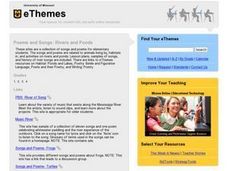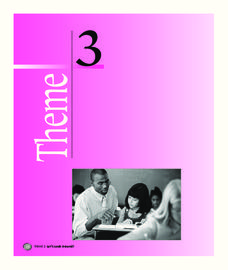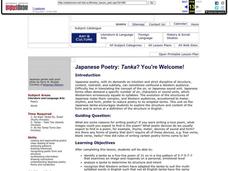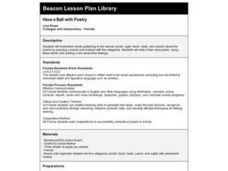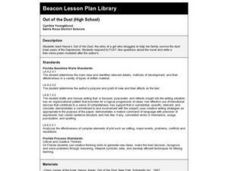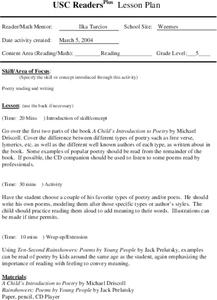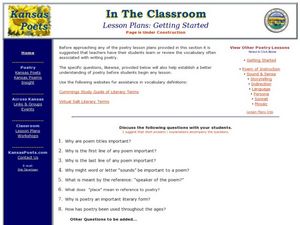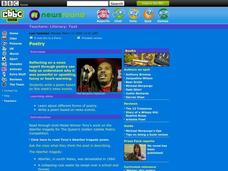Curated OER
Poetry: Using Prosodic Devices
Students examine poetry examples in free verse focusing on their prosodic elements. After critiquing works by several authors, they write their own poems utilizing such devices as alliteration, repetition, rhyme, and stanzas.
Curated OER
Poems and Songs: Rivers and Ponds
Young scholars explore songs and poems related to the animals, habitats, and activities on rivers and ponds. They listen to song clips, explore various websites, read poems and song lyrics, complete worksheets, and define key vocabulary...
Curated OER
Ballad
Young balladeers analyze examples of ballads and generate a list of common traits (story, quatrains, rhyme schemes, refrains, etc.), then identify these traits in Robert W. Service's "The Cremation of Sam McGee" and a ballad written by...
Houghton Mifflin Harcourt
Let’s Look Around!: Challenge Activities (Theme 3)
Let's Look Around! is the theme of a unit that offers a plethora of challenge activities. Enhance your scholars' learning experiences and reinforce concepts with activities such as writing a book about farm animals, an imaginary place,...
Curated OER
Exploring the Life of a Slave
Eleventh graders explore importance of abolitionists who worked to advance freedoms of black Americans prior to/during Reconstruction era, read and identify key concepts in Frederick Douglass's narrative, recognize how Douglass's slave...
Curated OER
Japanese Poetry: Tanka? You're Welcome!
Students explore the structure and content of the Tanka form and to arrive at a definition of the structure in English. They analyze a tanka to determine its structure and intent and compose two Tanka; one in traditional form and one...
Curated OER
Prairie Poetry
Ninth graders take note of the ways in which word choice, rhythm, language and narrative voice, as well as point of view in a poem can be used to evoke a time and place. They use their insights to create a poem of their own.
Curated OER
Ideas for Teaching Creative Poetry
Students read and write a variety of forms of poetry and create an original page for a class "I Spy" book. They read and discuss the form of poetry used in the "I Spy" books, and conduct Internet research on how the "I Spy" books are...
Curated OER
Poetry Anthology of Basic Forms
Students explore the format of the following poetic forms: acrostic, haiku, cinquain, diamente, and free-verse.They create a handbook or anthology of these poetic forms, with at least one sample of original work in each format.
Curated OER
Have a Ball with Poetry
Second graders brainstorm words pertaining to the senses about the beach. They write a free verse poem, using these words and adding a line about their feelings.
Curated OER
African American Poetry: Family and Traditions
Young scholars are introduced to the elements of African-American poetry. As a class, they are read different types of poems to discover there are different styles of poems and practice rhyming words. They share information on their...
Curated OER
Poetic Elements
Poetry is all about sound and rhythm. The sound of the words, the rhythm of the lines, and the emotional atmosphere created by these elements and the literary devices poets use, compress whole stories into a few stanzas. The specialized...
Curated OER
Out of the Dust 4
Eighth graders read the novel, "Out of the Dust," and create a free-verse poem about a treasure of their own. They use the attached checklist to evaluate their own poem.
Curated OER
Out of the Dust (High School)
Fourth graders read Hesse's "Out of the Dust". They respond to questions about the novel and write a free-verse poem modeled after the author's.
Curated OER
Lesson Plan for Waiting to Waltz: A Childhood by Cynthia Rylant
Sixth graders examine the elements of writing poetry. In this creative writing activity, 6th graders discuss a book of poetry in the setting of Appalachia. Students incorporate childhood experiences into the development of visual and...
Curated OER
Insight Arts
Students view a mural and identify, describe, and discuss what they see. They are introduced to and demonstrate the functions of key structural elements of poetry by writing a poem about themselves that highlights their interests and...
K12 Reader
Figurative Language: Edgar Allan Poe’s “The Bells”
Bells, bells, bells abound in a worksheet designed for Edgar Allan Poe's famous poem "The Bells." Middle schoolers are asked to identify the various poetic devices Poe employs.
Curated OER
Poetry Reading and Writing
Fifth graders go over with teacher the two parts of the book A CHILD'S INTRODUCTION TO POETRY discussing the different types. They choose a couple of their favorite types or poets and write their own poems following the poet's particular...
Curated OER
Poetry: Getting Started
Students define literary terms and answer short answer questions about poetry. In this poetry starter lesson, students discuss the importance of titles, first and last lines, sounds, and speaker. Students define a set of literary terms...
Poetry4kids
Five Ways to Overcome Writer’s Block
Every writer knows how terrible writer's block can feel. Use these five writer's block-busting techniques to help young writers get out of their rut and into a better state of mind.
Illinois Department of Natural Resources
Section Two: Why is Biodiversity Important?
Explore soil, genetic traits, natural resources, and pollution in a series of lessons that focus on biodiversity. Kids complete experiments to learn more about the importance of varied genes and organisms in an ecosystem.
Curated OER
Poetry of the City
Students explore Walt Whitman and about poetry. Most importantly, it teach them that poetry is something anyone can write and encourage them to tell the story of their own community in verse
Curated OER
Poetry
Students reflect on a news report through poetry. Students write a poem based on this week's news events. Students share poems with each other. Students reflect on a poem of their choosing.
Curated OER
The Power of Poetry
Students utilize the Internet to research figures of speech used in poetry and poetry terms



